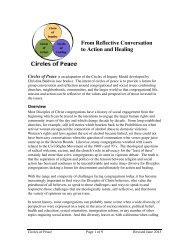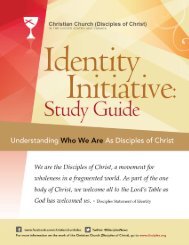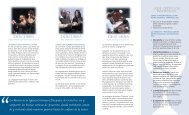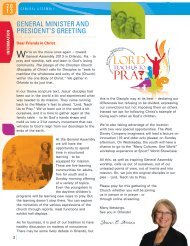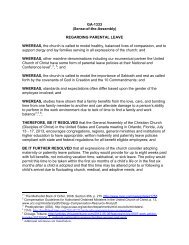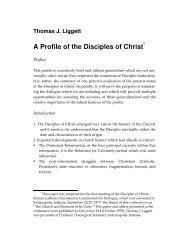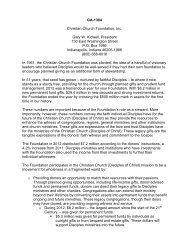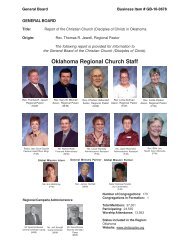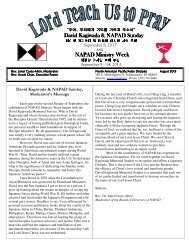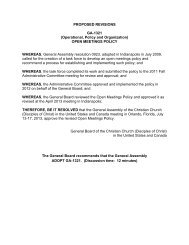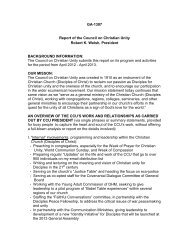RESOURCING THE CHURCH FOR ECUMENICAL MINISTRy A ...
RESOURCING THE CHURCH FOR ECUMENICAL MINISTRy A ...
RESOURCING THE CHURCH FOR ECUMENICAL MINISTRy A ...
Create successful ePaper yourself
Turn your PDF publications into a flip-book with our unique Google optimized e-Paper software.
Contextual and Local<br />
Ecumenism<br />
Christopher B. Morton<br />
Rev. Christopher B. Morton, is the Executive<br />
Director of Associated Ministries in Tacoma Washington.<br />
It was truly a pleasure to study with Dr. John Poebe,<br />
who was, at the time, if I remember correctly, the<br />
director of Bossey Institute. During the course on<br />
ecumenism taught by Dr. Poebe at LTS, I remember<br />
him saying distinctly that at the core of ecumenism<br />
is relationships. Through all of the studies of<br />
Scripture demonstrating God’s desire for unity,<br />
growing in my understanding of words like koinonia,<br />
syncretism and dialogue, it was made clear that at<br />
heart of it all was relationships. Two key words for<br />
ecumenism, as I learned about it then, were<br />
relationships and dialogue. In fact, it was made clear<br />
that central to dialogue is the willingness of the<br />
people to be vulnerable and open to one another.<br />
To be truly in relationship. Whether bilateral,<br />
multilateral, or interfaith, dialogue is essentially the<br />
genuine encounter with and of the other person. In<br />
his book, Theology by the People, Poebe states, “the<br />
ecumenical movement gets nowhere unless and<br />
until ordinary church people are involved in it,<br />
embrace it and carry the torch for ecumenism.”<br />
That sort of theological grounding of ecumenism,<br />
coupled with my independent study on local<br />
ecumenism with Dr. Michael Kinnamon, has<br />
taught me a few things to keep in mind as God<br />
continues to call me to an ecumenical vocation.<br />
Associated Ministries builds community that is humane,<br />
compassionate, and just. As you can see from the handouts,<br />
the mission statement is lived out by our<br />
primarily becoming a community service agency.<br />
Through an array of more than 25 services, and a<br />
history of incubating significant ministries like<br />
FISH Food Banks, Emergency Food Network,<br />
Pierce County Habitat for Humanity, and Pierce<br />
22<br />
County AIDS Foundation, Associated Ministries<br />
has identified ways that the religious community can<br />
contribute to strengthening the broader communities<br />
where no one else was willing or able to go.<br />
Years ago the 14 emergency sheltering providers of<br />
Pierce County asked Associated Ministries to be the<br />
neutral place where complaints could come to be<br />
resolved, dollars could come to be distributed, and<br />
regulations could be upheld. Today Associated<br />
Ministries has more than seven housing and shelter<br />
services, including the management of more than<br />
$1.5 million in emergency shelter, rental assistance<br />
and utility assistance funding. And we conduct site<br />
visits of all 14 shelters to ensure that they are in<br />
compliance with the federal and state rules and<br />
regulations. While our member congregations are<br />
not directly engaged in that ministry, it is incumbent<br />
upon us at Associated Ministries to<br />
demonstrate to our member congregations how<br />
each time that Laura, our Intake Specialist, answers<br />
the phone, she is responding on behalf of the<br />
churches. Last Tuesday, Laura worked with 97<br />
people who called our dedicated phone line looking<br />
for housing and shelter services, and I am convinced<br />
that every day Laura and the staff in housing and<br />
shelter services literally save people’s lives—maybe<br />
not by providing assistance, but by being in relation<br />
to and with the person who is calling. Not always<br />
mindful of it, but nonetheless on behalf of our 250<br />
member congregations.<br />
Which is all to say that there are significant challenges<br />
facing the local ecumenical organization.<br />
The gap between the constituting members (that is,<br />
congregations and judicatories) and local and<br />
regional ecumenical organizations continues to<br />
grow, just as the pressing chasm between pulpit and<br />
pew. It’s not a matter of interest, or even desire, but



